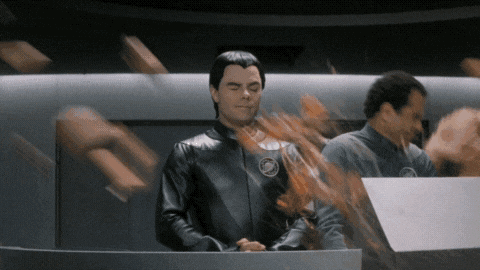Nightmare On Memory Lane
Always lead with the good news: Nightlife, my third novel, is headed for a new print edition. It will be coming from Crossroad Press, who have issued the e-book edition for the past several years.
This makes me happy. On the other hand…
A few days ago I finished proofing a PDF galley of the print workup. It was my first time looking over the novel since … well, decades ago, it would have been. I was expecting something like a class reunion. Several enjoyable hours spent in the company of people I used to know; characters who, at one phase in my life, I was spending a lot of time with. Every day.
And then, after all these years, we finally got together again and I couldn’t stand them. Jesus Christ, what did I ever see in you obnoxious twats back then?
It was a slog. Because I was cringing on every page.
But First, A Disclaimer
Part of this reaction was because the text had been ported over from the e-book edition, and until now I’d been blissfully ignorant of the typos that had infiltrated it. The e-book’s text came from an Optical Character Recognition scan of the original 1991 paperback. Sometimes OCR gets it wrong, but that’s what proofreaders are for. Unless you hire one like Crossroad did at the time, who was fired when it became apparent they were taking the paychecks but not bothering with the part about finding the mistakes. Until a reader complains and calls it to your attention, you may not realize something’s gone out with glitches.
With Nightlife, nobody complained.
Why use not a Word doc as the source for all this? There wasn’t one. Nightlife was an early enough novel that it was the last thing I did on an electric typewriter before migrating to my first Mac.
So when you, as the author, sit down and on page 2 discover that your gone-native missionary in the Amazon rain forest is now praying to Cod, you realize with mounting dread that you’re in for a cringe-fest.
Typos, like software bugs, will get squashed. Eventually.
Sorry about that.
It Seemed Like a Good Idea at the Time
Typos, however, were a far lesser cause for the ordeal I found this process to be. Instead, it was more about the mortification incurred by wearing a hairshirt woven out of one’s own past.
A frequent thought echoed throughout: I would never write this today. And if I did, I wouldn’t write it this way.
Now, I can’t say, with hindsight, that Nightlife wasn’t really the novel I meant to write at the time. It was. It turned out exactly as intended.
One of its earliest seeds was a line in an interview with author David J. Schow, whose work I’ve always greatly admired with what John D. MacDonald labeled “grinding envy.” He described his then-forthcoming second novel, The Shaft, as a “Miami Vice horror novel.”
That instantly lit me up. I loved the notion, because I loved the series Miami Vice. I wished I’d thought of this particular cross-pollination — a horror novel that’s half crime novel, with the backdrop and glitzy-seedy aesthetics of the era’s Florida cocaine trade. But it looked like Dave beat me to it, and I didn’t want to look like a copycat.
Then The Shaft came out and it was nothing as I’d expected. The connections implied by Dave’s description eluded me. The novel was set mainly in an apartment building in Chicago during a brutal winter. They’re all brutal. I’m originally from Illinois, so I know firsthand: Few things are less reminiscent of South Florida than a Chicago winter.
I was thrilled.
Green light. I can jump on this after all.
“And It Exploded”
To be sure, Nightlife brought a lot of good my way.
After a couple of novels that were done squarely within the shadow of Stephen King’s influence, it now felt that I was starting to scoot out from under that and gel my own voice and sensibilities.
It was slotted, after Kathe Koja’s The Cipher, as the second release of the then-new Dell Abyss line. It was the start of my author-editor relationship with Jeanne Cavelos, which was enormously rewarding and taught me a great deal over four novels.
It drew a highly gratifying promo quote from Robert B. Parker, who’d become an idol of mine. According to Jeanne, Stephen King singled Nightlife out to her as something from the Abyss line that he’d particularly enjoyed.
It was well received and well reviewed, and soon optioned for film. Even now, it’s under option by a production company working with NBC Universal.
Eternal gratitude for all of that.
So why was I recoiling from the novel as if it were a teleportation accident turned inside-out?
The key lies with an observation that, as serendipity so often has it, sent up a flare during a concurrent reread of Austin Kleon’s Show Your Work:
“Anyone who isn’t embarrassed of who they were last year probably isn’t learning enough.” — Alain de Botton
That strikes me as a bit of an accelerated timeframe. Point taken, though.
Group Hugs For One
Still, it wasn’t like this was some sort of thunderstroke revelation. I was plenty lucid about what was going on. It was just good to see someone else crystallize it so succinctly, with impeccable timing.
I wasn’t so much hating the novel as feeling the discomfort of squishing my face to a time portal window and being forced to observe my shortcomings and immaturities from that era. Dialogue that wasn’t as smooth as it could’ve been. Metaphors that strained too hard, or didn’t need to be there at all. Taking fifty words to say something that could’ve been said in thirty. Other random stuff that grated on my nerves.
Embarrassed? Often.
Annnd … this is as exactly it should be, because there’s a name for the opposite of this feeling: stagnation.
Whatever figurative womb you emerged from, you almost certainly didn’t emerge fully formed. To be is to develop, a sometimes painful process that may take years. It may take a lifetime. You might have grown weird malignancies and vestigial parts along the way, before shedding them and editing your DNA so it doesn’t keep happening. Even though it makes looking back a part of that pain.
By the end of our reunion, Nightlife still won me over. Call it an 80/20 split. 80% self-forgiveness for not yet being as developed as I wished I could’ve been. 20% recognition that I was closing the gap, a little. The main thing every novel teaches you, I’ve heard, is how to write that novel. It began to look to me that I was learning. Benefitting from all the on-the-job training I was getting.
I’m still getting it.
Whatever it is you make, to look back in embarrassment at what felt at the time like the ceiling of the Sistine Chapel, and now seeing it as Monkey Jesus, is to recognize how far you’ve come. Your standards have elevated. You have been fire-hardened, burning away impurities in the forge of your own exuberant semi-competence.
So be proud. Just not too proud, and not for too long. If the gods are kind, next year, or next decade, you may look back at your best-in-show of today and hit the gag reflex all over again.





Sometimes there are years that we’re grimly happy to see drop off the calendar and land in the mud as we slog on, trample them under, and leave them behind.